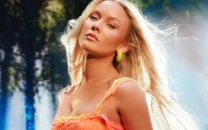Tyla addresses misunderstandings about her cultural identity: ‘Never denied my blackness’
The 22-year-old took to X to confront claims she's denying her Blackness.
1718348150-0/BeFunky-collage-(48)1718348150-0-640x480.webp)
Tyla, one of 2023's most electrifying breakout stars, has recently found herself at the center of an unexpected controversy regarding her racial identity.
After her debut single "Water" soared to over 670 million streams on Spotify and her album featuring hits like "Jump" and "Truth Or Dare" solidified her status in the music industry, Tyla faced accusations of colorism from her online followers.
In a response on X (formerly known as Twitter), Tyla sought to clarify her identity and cultural background: “Yoh guys. Never denied my blackness, idk where that came from. I’m mixed with black/Zulu, Irish, Mauritian/Indian and Coloured. In Southa I would be classified as a Coloured woman and other places I would be classified as a black woman. Race is classified differently in different parts of the world," she stated.
The term "Coloured," while considered outdated and pejorative in America, has a distinct context in South Africa, stemming from its apartheid history.
Tyla's self-identification led to confusion among some international audiences, particularly when she described her mixed heritage in a pre-fame video, explaining the cultural significance of Bantu knots and her diverse background.
Addressing the misconception in a Cosmopolitan cover story, Tyla stated, "When people are like, 'You’re denying your Blackness,' it’s not that at all. I never said I am not Black. It’s just that I grew up as a South African knowing myself as Coloured. And now that I’m exposed to more things, it has made me other things too. I’m also mixed-race. I’m also Black. I know people like finding a definition for things, but it’s 'and,' not 'or.'"
As Tyla continues to navigate her global fame, she emphasizes a nuanced understanding of identity, concluding with the Zulu slang, "Asambe!" signaling a move forward from the conversation about her racial classification.






-(1)1718534695-0/house-of-dragon-(1)-(1)1718534695-0-208x130.webp)












COMMENTS
Comments are moderated and generally will be posted if they are on-topic and not abusive.
For more information, please see our Comments FAQ